裕兴新概念英语第一册笔记:Lesson 54 What nationality are they
新概念英语第一册学生用书Lesson54
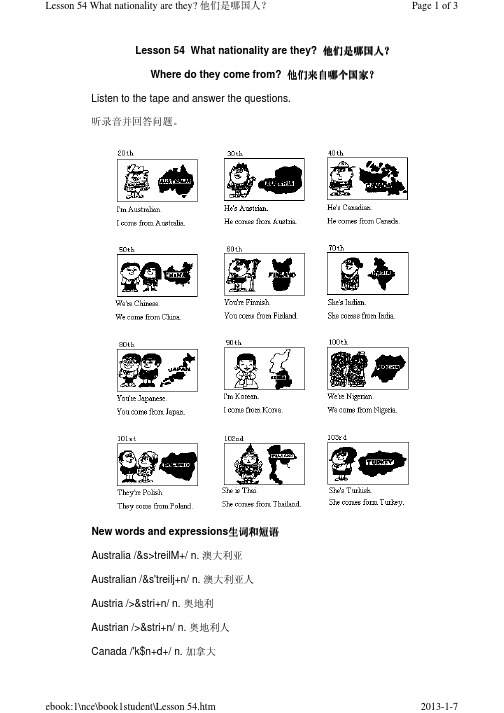
Lesson 54 What nationality are they? 他们是哪国人?个国家家?Where do they come from? 他们来自哪个国Listen to the tape and answer the questions.听录音并回答问题。
和短语语New words and expressions生词和短Australia /&s>treilM+/ n. 澳大利亚Australian /&s'treilj+n/ n. 澳大利亚人Austria />&stri+n/ n. 奥地利Austrian />&stri+n/ n. 奥地利人Canada /'k$n+d+/ n. 加拿大Canadian /k+'neidi+n/ n. 加拿大人China />tMain+/ n. 中国Finland /'finl+nd/ n. 芬兰Finnish /'finiM/ n. 芬兰人India /'indi+n/ n. 印度Indian /'indi+n/ n. 印度人Japan /dN+'p$n/ n. 日本Nigeria /nai'dNi+ri+/ n. 尼日利亚Nigerian /nai'dNi+ir+n/ n. 尼日利亚人Turkey /'t*:ki/ n. 土耳其Turkish /'t*:kiiM/ n. 土耳其人Korea /k+'ri+/ n. 韩国Polish /'p+uliM/ n. 波兰人Poland /'p+ul+nd/ n. 波兰Thai /tai/ n. 泰国人Thailand /'tail+nd/ n. 泰国练习Written exercises书面练习A Write questions and answers.模仿例句写出与下列句子相对应的疑问句和否定句。
新概念英语第一册知识点梳理
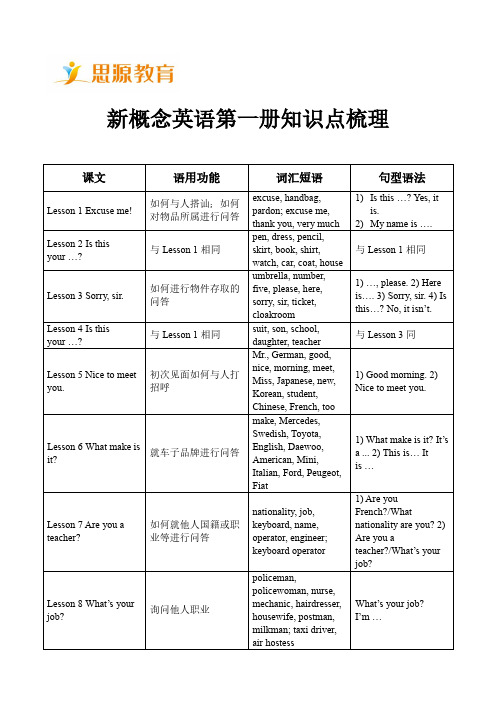
jobs? They are keyboard operators. 3) Who is this young man? This is Jim. He’s our office assistant. What are their jobs? They are sales reps. 1) What’s matter, children? We are tired and thirsty, Mum. 2) Are you all right now? No, we
Lesson 11 Is this your 所有格的形式与表达 whose, blue, perhaps,
shirt?
white, catch
Lesson 12 Whose is this …? This is my/your/his/her … Whose is that …? That is my/your/his/her …
与 Lesson 1 相同
Lesson 5 Nice to meet 初次见面如何与人打
you.
招呼
Lesson 6 What make is 就车子品牌进行问答 it?
Lesson 7 Are you a teacher?
如何就他人国籍或职 业等进行问答
Lesson 8 What’s your 询问他人职业 job?
Lesson 32 What’s he/she/it doing?
与 Lesson 31 同
Lesson 33 A fine day 与 Lesson 31 同
Lesson 34 What are they doing?
新概念英语第一册lesson53-54

dry adj. 干燥的
rise [raiz] v.升起
rise是“上升,上涨,起床,站立”的意思。 该词含义较广,总的意思是指依次上升, 如自然界的日、月、星、雾、云的上升, 人体从睡、跪、坐、躺等姿势站立起来等。 该词为不及物动词, raise v. 举起raise用作及物动词,其基本含 义是“使升起来,举起”
gentle : 指温柔、亲切、优雅。
常含有节制和意味。
mild : 用于人时,指天性温顺,脾气好,不 放肆粗野;用于物时,主要指适度,程度 上相当缓和给人以愉快感觉。
soft : 侧重柔软或安稳、光滑,使人不感到 粗糙或严酷。
always adv.总是
sometimes 有时,偶尔
Taiwan is in the southeast of China. 台湾省位于中国的东南部。(在中国以内) Japan lies to the east of China. 日本位于中国的东方。(在中国之外) North Korea on is the east of China. 朝鲜紧邻中国的东部。(与中国相邻)
HANS: Where do you come from? JIM: I come from England. HANS: What’s the climate like in your country? JIM: It’s mild, but it’s not always pleasant. The weather’s often cold in the North and windy in the East . It’s often wet in the West and sometimes warm in the South. HANS: Which seasons do you like best? JIM: I like spring and summer.The days are long and the nights are short.The sun rises early and sets late. JIM:I don’t like autumn and winter. The days are short and the nights are long.The sun rises late and sets early. Our climate is not very good, but it’s certainly interesting. It’s our favourite subject of conversation.
裕兴新概念英语第一册笔记(完整版)
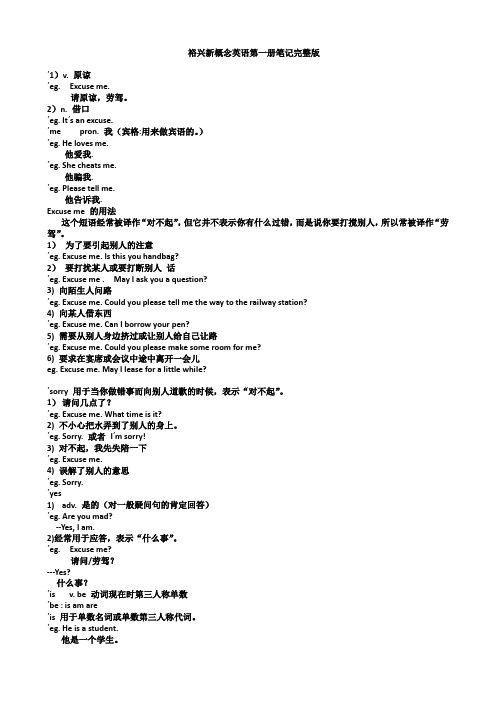
裕兴新概念英语第一册笔记完整版΄1)v. 原谅΄eg. Excuse me.请原谅,劳驾。
2)n. 借口΄eg. It΄s an excuse.΄me pron. 我(宾格:用来做宾语的。
)΄eg. He loves me.他爱我.΄eg. She cheats me.他骗我.΄eg. Please tell me.他告诉我.Excuse me 的用法这个短语经常被译作“对不起”,但它并不表示你有什么过错,而是说你要打搅别人,所以常被译作“劳驾”。
1)为了要引起别人的注意΄eg. Excuse me. Is this you handbag?2)要打扰某人或要打断别人话΄eg. Excuse me . May I ask you a question?3) 向陌生人问路΄eg. Excuse me. Could you please tell me the way to the railway station?4) 向某人借东西΄eg. Excuse me. Can I borrow your pen?5) 需要从别人身边挤过或让别人给自己让路΄eg. Excuse me. Could you please make some room for me?6) 要求在宴席或会议中途中离开一会儿eg. Excuse me. May I lease for a little while?΄sorry 用于当你做错事而向别人道歉的时候,表示“对不起”。
1)请问几点了?΄eg. Excuse me. What time is it?2) 不小心把水弄到了别人的身上。
΄eg. Sorry. 或者I΄m sorry!3) 对不起,我先失陪一下΄eg. Excuse me.4) 误解了别人的意思΄eg. Sorry.΄yes1)adv. 是的(对一般疑问句的肯定回答)΄eg. Are you mad?--Yes, I am.2)经常用于应答,表示“什么事”。
Lesson54Wheredotheyefrom(课件)新概念英语第一册

Day 5
习题训练
Choose the best answer.
-____B___ pencil is it? -It is Mary’s book.
Day 5
习题训练
Choose the best answer.
-____A___ is the beautiful girl? -She is my sister.
He is German.
Translation: -她是法国人。她从法国来。
She is French.
Translation: -你们国家的气候怎么样?
What’s is the climate like in your country ? How’s is the climate in your country ?
We are Chinese.
Translation: -你是日本人。你来自日本。
You are Japanese.
Translation: -他是加拿大人。他来自加拿大。
He is Canadian.
Day 5
习题训练
Australians
rainy
Day 5
doesn’t like like
Who is she ?
What nationality is she ? She is Chinese.
他来自澳大利亚,他是一个澳大利亚人。
He is an Australian.
Aus tra lia Aus tra lian
他来自加拿大,他是一个加拿大人。
He is a Canadian.
Answers
Day 5-易混淆句式和单词区分。
区分
Translation: 你们国家的气候怎么样?
新概念 1 Lesson 53~ 54

一、单词& 课文d adj. 温和的、温暖的、文雅的温和的气候mild climate 温和的天气mild weather温暖的n./v./adj. 宜人的、舒适的天气晴朗的多雨的多雪的多风的多雾的问气候:---What’s the climate like ... ? --- It’s ... .问天气:---What’s the weather like ... ?/ How’s the weather ... ? ---It’seg1. 你们国家的气候怎么样?the your ? eg2. 气候非常的宜人。
very .eg3. 澳大利亚的气候怎么样?the ? eg4. 气候非常的温和。
very .eg5. 春天的天气怎么样?the ?the ? eg6. 非常的温暖。
very .2.总是属于副词一般用于时态经常、常常经常有时候很少、几乎不/ 从未、从不3.东方east n./adj./adv. eastern adj. 西方west n./adj./adv. western adj. 南方south n./adj./adv. southern adj. 北方north n./adj./adv. northern adj.在东边in the east在...的东边in the east of ...East 东部东方国家eastern countrieseg1. 他住在美国的东边。
He lives in the east of America. = He lives in America. eg2. 东部的天气经常很寒冷。
The weather’s cold the .It’s cold the .eg3. 南部有时候是温暖的。
warm .eg4. 西部经常是潮湿的。
. eg5. 北部经常下雨。
It the .eg6. 北部经常是多雨的。
It the . 4.wet n. 雨天湿气dry n. 干涸v. 弄湿v. 把...弄干adj. 潮湿的adj. 干燥的、口渴的、枯燥无味的eg1. 天气非常的潮湿。
新概念英语一 第五十四课 乐锄讲解

《新概念英语一》第五十四课“乐锄讲解”是一篇富有趣味和教育意义的文章。
这篇文章主要讲述了一个关于家庭农场和承包经营的故事,以及通过这个故事展示了不同的工作态度和思考方式。
在这篇文章中,我将会从不同的角度对这个主题进行全面的评估和深入的探讨,以便您能更全面、深入地理解这个主题。
让我们从乐锄的故事入手,探讨家庭农场和承包经营的意义。
在这篇文章中,乐锄代表了一种积极乐观的工作态度和努力拼搏的精神,通过不懈的努力和耕耘,他使得家庭农场逐渐繁荣起来。
这反映了我国农村改革开放以来,承包经营给农村带来的变化和发展。
具体而言,我们可以从经济、社会和文化等多个方面对这种变化进行分析和评估,以及这种变化对农村人民生活和思想观念的影响。
我们可以从乐锄所表现出的工作态度和思考方式入手,思考工作态度对个人和社会的重要性。
在文章中,乐锄用自己的行动和努力证明了勤劳和坚持的价值,他不仅改善了自己的生活,也为周围的人树立了榜样。
通过对乐锄的案例分析,我们可以从劳动价值、职业素养、创业精神等方面进行评估,以及这种正能量对于社会的积极影响。
再次,我会总结回顾《新概念英语一》第五十四课“乐锄讲解”的内容,归纳这个主题的要点和精华,以便您能更全面、深刻和灵活地理解这个主题。
通过总结和回顾性的内容,我相信您会更加深入地理解这篇文章所传达的意义和价值。
我想共享一下我对这个主题的个人观点和理解。
我认为《新概念英语一》第五十四课“乐锄讲解”所阐述的家庭农场和承包经营的故事,不仅具有教育意义,也让人们思考工作态度和努力拼搏的价值。
这种正能量的传播,对于激励每个人更积极面对生活和工作,具有重要意义。
在这篇文章中,我将会按照知识文章格式,使用普通文本撰写,包含总结和回顾性的内容,并通过多次提及“新概念英语一”第五十四课“乐锄讲解”的内容,确保文章的深度和广度兼具。
我会精心选取详实的案例和数据,以便对这个主题进行全面评估。
我会保证文章的总字数大于3000字,以确保文章的深度和丰富性。
新概念英语第一册笔记
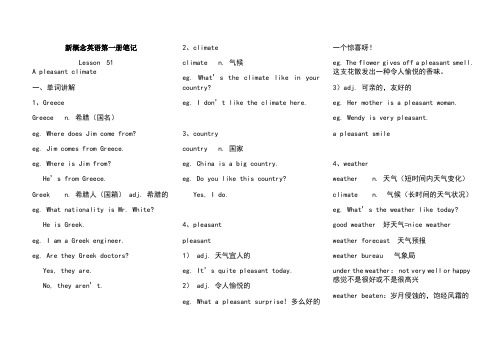
新概念英语第一册笔记Lesson 51A pleasant climate一、单词讲解1、GreeceGreece n. 希腊(国名)eg. Where does Jim come from?eg. Jim comes from Greece.eg. Where is Jim from?He’s from Greece.Greek n. 希腊人(国箱) adj. 希腊的eg. What nationality is Mr. White?He is Greek.eg. I am a Greek engineer.eg. Are they Greek doctors?Yes, they are.No, they aren’t.2、climateclimate n. 气候eg. What’s the climate like in yourcountry?eg. I don’t like the climate here.3、countrycountry n. 国家eg. China is a big country.eg. Do you like this country?Yes, I do.4、pleasantpleasant1) adj. 天气宜人的eg. It’s quite pleasant today.2) adj. 令人愉悦的eg. What a pleasant surprise! 多么好的一个惊喜呀!eg. The flower gives off a pleasant smell.这支花散发出一种令人愉悦的香味。
3)adj. 可亲的,友好的eg. Her mother is a pleasant woman.eg. Wendy is very pleasant.a pleasant smile4、weatherweather n. 天气(短时间内天气变化)climate n. 气候(长时间的天气状况)eg. What’s the weather like today?good weather 好天气=nice weatherweather forecast 天气预报weather bureau 气象局under the weather: not very well or happy感觉不是很好或不是很高兴weather beaten:岁月侵蚀的,饱经风霜的the weather beaten rocks:风雨侵蚀的岩石a weather beaten face:沧桑的脸4、springspring1) n. 春季eg. My father likes spring.eg. Do you like spring?Yes, I do.No, I don’t.2) n. 弹簧5、windywindy adj. 有风的eg. What’s the weather like today?eg. It’s windy.wind n. 风eg. There is much wind today. 今天风很大。
裕兴新概念学习笔记 第一册(53-54)
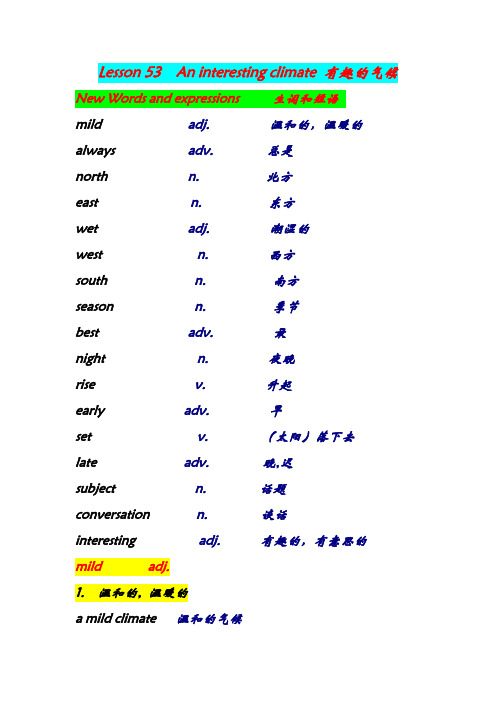
Lesson 53 An interesting climate 有趣的气候New Words and expressions 生词和短语mild adj. 温和的,温暖的always adv. 总是north n. 北方east n. 东方wet adj. 潮湿的west n. 西方south n. 南方season n. 季节best adv. 最night n. 夜晚rise v. 升起early adv. 早set v. (太阳)落下去late adv. 晚,迟subject n. 话题conversation n. 谈话interesting adj. 有趣的,有意思的mild adj.1. 温和的, 温暖的a mild climate 温和的气候eg. We had a mild winter last year.我们去年过一个温暖的冬季.2. (性情) 温和的gentel 是后天的一种修养,表示文雅的. eg. John is a mild man.3. 味道谈的eg. Try this mild dish.试试这个味道谈一点的菜.His grandfather likes the mild taste.他的爷爷喜欢这个清淡的味道.wild adj. 野性的,野蛮的a wild elephant 一头野象always adv. 总是--- Do you always stay at home in the evening?Not always.The boy is always asking why.这个男孩子老是问这问那没个完.The baby always cries at night.north n. 北方/ adj. 北方的in the north of .... 在...的北部eg. Hebei Province is in the north of China.河北省在中国的北部.east n. 东方/adj. 东方的eg. The red sun rises in the east.红太阳在东方升起.northeast 东北部,东北in the northeast 在东北wet adj. 潮湿的dry 干的wet clothes 湿衣服be wet through 全身湿透了get wet througheg. Don't go out. You'll get wet through. eg. My coat is wet through.west n. 西方/adj. 西方的in the west 在西方northwest 西北south n. 南方/adj. 南方的southwest 西南southeast 东南season n. 季节spring, summer , autumn, wintereg. Autumn is the best season for travel.in the high season 在旺季in the low season 在淡季best adv. 最eg. I like winter.我喜欢冬季.I like winter best.我最喜欢冬季.night n. 夜晚in the morningin the afternoonin the eveningat night 在夜里all night(long) 整夜day and night 整夜整夜eg. He often comes home from work at night.他经常天黑才下班回家.rise1. v. 升起,上升eg. The sun rises in the east.太阳从东方升起.2. v. 起身, 起床eg. My mother always rises early.我母亲总是很早起床.sunrise n. 日出early1. adv. 早eg. You must come home early. (early 是副词修饰动词come)2. adj. 早的in the early morning一大早( early 是形容词. 修饰名词morning )set v. (太阳) 落下去eg. In the summer, the sun sets late.sunset n. 日落,傍晚late1. adv 晚,迟eg. He usually goes to school late. ( late 是副词修饰动词goes)2. adj. 晚的in the late afternoon 在下午晚些时候in the late autumn 晚秋be late for ... 做某事迟到eg. Don't be late for school.Sorry, Mum , I'm late for the dinner.很抱歉妈妈,我回来吃饭晚了.Interesting adj. 有趣的,有意思的反义词dull : uninterestingeg. The film is very interesting.Are these books interesting?That is an interesting game.be interested in ... 对...感兴趣eg. He is interested in English.We are interested in the book. subject1. n. 话题,题目eg. Let's change the subject.让我们改换话题吧.We must return to our subject.我们该回到我们的问题上去.2. n. 学科eg. We learn eight subjects a year. conversation n. 谈话be in conversation with .... 与... 谈话中eg. She is in conversation with the boss. talk n. 谈话,交谈eg. Let's have a talk.让我们谈一谈.TEXT 课文Questions:1. What's the climate like in England?2. Which seasons does Jim like?Listen to the tape then answer this question.和听录音,然后回答问题。
新概念英语词汇速记手册1新概念1词汇Lesson54

新概念英语词汇速记手册 1 新概念 1 词汇Lesson 54Australia 澳大利亚I come from Australia. 我来自燠大利亚。
The tennis match will take place in Australia. 网球比赛将在澳大利亚举行。
It's winter now in Australia. 在澳大利来亚,现在是冬天。
Australian 澳大利亚人,澳大利亚的I'm Australian.我是澳大利来人。
He is an Australian writer. 他是一位澳大利亚作家。
Nicole Kidman is an Australian.尼科尔•基德曼是澳大利亚人。
Austria 奥地利He comes from Austria.他来自奥地利。
Austria is famous for its opera. 奥地利以它的歌剧而闻名。
I am taking a holiday to Austria next month.我下个月将到奥地利旅游。
Austrian 奥地利人,奥地利的He's Austrian. 他是奥地利人。
Her husband is an Austrian. 她的丈夫是个奥地利人。
He is an Austrian pianist. 他是一位奥地利钢琴家。
Canada 加拿大He comes from Canada. 他来自加拿大。
Canada is a neighbour of the U.S. 加拿大和美国是邻国。
His parents moved to Canada last year. 他的父母去年到加拿大定居。
Canadian加拿大人He's Canadian. 他是加拿大人。
Do you know any Canadian singer? 你知道一些加拿大歌手吗?One of my teachers is Canadian. 我的老师中有一位是加拿大人。
新概念英语第1册第53-54课重点语法

⼀、重要句型或语法 1、⼀般现在时 1)表⽰天⽓,如:The weather's often cold in the North and windy in the East. 2)表⽰⽓候,如:What's the climate like in your country? It's mild, but it's not always pleasant. 3)季节喜好的问答,如:Which seasons do you like best? I like spring and summer. 2、国籍的问答 Where do you come from? I come from England. ⼆、课⽂主要语⾔点 I come from England. England表⽰“英格兰”,但在英语⾥经常⽤来指代整个英国。
It's mild, but it's not always pleasant. mild表⽰“温和的;温暖的”。
可以让学⽣学习使⽤句型:It's ..., but it's not always ...。
The weather's often cold in the North and windy in the East. 英语⾥,东南西北的表达需要梳理。
表⽅位时,要注意东南、东北、西南、西北的表达,英语⾥是:southeast, northeast, southwest, southeast。
此外,当⽅向⾸字母⼤写时,⼀般不再指⽅位,⽽是指地域,如课⽂中的the North就是指北部地区。
Which seasons do you like best? 结合第51课,复习四季的表达。
要注意的是,“秋天;秋季”美语⾥经常⽤fall来表⽰。
The days are long and the nights are short. 可以补充⼀点有关不同季节昼夜长短的变化知识。
裕兴新概念英语第一册笔记:Lesson 52 What nationality are they

Lesson 52What nationality are they?Where do they come from?New words and expressions:the U.S.美国Brazil n.巴西Holland n.荷兰England n.英国France n.法国Germany n.德国Italy n.意大利Norway n.挪威Russia n.俄罗斯Spain n.西班牙Sweden n.瑞典the U.S.美国(国名)the U.S.A.-- the United States of America 美利坚合众国American n.美国人(国籍)adj.美国的eg.--- Where does he come from?--- He comes from the U.S.eg.--- What nationality are they?--- They are American.Brazil n.巴西(国名)Brazilian n. 巴西人 adj.巴西的eg.--- Are they from Brazil?--- Yes, they are.--- Do they come from Brazil?--- Yes, they do.eg. This is a Brazilian car.Holland n.荷兰Dutch n.荷兰人 adj.荷兰的eg. She isn't from Holland.She doesn't come from Holland.eg. They are Dutch. Are they Dutch?No, they aren't.England n. 英国(英格兰)Britain n. 英国(国名)UK: United Kingdom of Great Britain and Northern Ireland English n. 英国人,英语 adj. 英国的British n. 英国人 adj. 英国的eg.My friend isn't from England.My friend isn’t from Britain.My friend doesn't come from England.My friend doesn't come from Britain.eg. Those tourists are English.Those tourists are British.eg. They speak English.France n. 法国(国名)French n. 法国人(国籍),法语adj. 法国的eg. Mr. Jackson and his wife come from France. eg.--- Where do they come from?--- They come from France.eg. They are French.They speak French.Germany n.德国(国名)German n.德国人,德语adj.德国的eg.--- Where does she come from?--- She comes from Germany.eg.--- Where is your sister from?--- She is from Germany.eg. She can speak German.eg. I can't speak German.eg. They are German.Italy n. 意大利(国名)Italian n.意大利人(国籍),意大利语adj. 意大利的eg. These engineers aren't from Italy.These engineers do not come from Italy. eg.--- Can you speak Italian?--- Yes, I can. / No, I can't.eg. We are not Italian.eg.--- Is this an Italian car?--- No, it isn't. It's a German car。
- 1、下载文档前请自行甄别文档内容的完整性,平台不提供额外的编辑、内容补充、找答案等附加服务。
- 2、"仅部分预览"的文档,不可在线预览部分如存在完整性等问题,可反馈申请退款(可完整预览的文档不适用该条件!)。
- 3、如文档侵犯您的权益,请联系客服反馈,我们会尽快为您处理(人工客服工作时间:9:00-18:30)。
Lesson 54
What nationality are they?
Where do they come from?
New words and expressions:
Australia n.澳大利亚Australian n.澳大利亚人Austria n.奥地利
Austrian n.澳大利人
Canada n.加拿大
Canadian n.加拿大人
China n.中国
Finland n.芬兰
Finnish n.芬兰人
India n.印度
Indian n.印度人
Japan n.日本
Nigeria n.尼日利亚
Nigerian n.尼日利亚人Turkey n.土耳其
Turkish n.土耳其人Korea n.韩国
Polish n.波兰人Poland n.波兰
Thai n.泰国人Thailand n.泰国
China--- the People's Republic of China
Exercise A:
Example:
The sun rises early.
Does the sun rise early?
The sun doesn't rise early.
1.The sun sets late.
Does the sun set late?
The sun doesn't set late.
2. He likes ice cream.
Does he like ice cream?
He doesn't like ice cream.
3. Mrs. Jones wants a biscuit.
Does Mrs. Jones want a biscuit?
She doesn't want a biscuit.
4. Jim comes from England.
Does Jim come from England?
He doesn't come from England.
Exercise B:
1. Jackson先生是来自哪个国家?
Where does Mr. Jackson come from?
他是来自澳大利亚吗?
Does he come from Australia?
是的,他是一个澳大利亚人。
Yes, he does. He is Australian.
2.她是来自哪个国家?
Where does she come from?
她来自加拿大,她是加拿大人。
She comes from Canada. She is Canadian. 3.他们是哪国人?
What nationality are they?
他们来自芬兰,他们是芬兰人。
They come from Finland. They are Finnish.
4. 我们不是来自印度。
We don't come from India.
5.他们是印度人吗?
Are they Indian?
不,不是,他们是尼日利亚人。
No, they aren't. They are Nigerian.
6.他们的朋友是从尼日利亚来的。
Their friends come from Nigeria,
7.你是从土耳其来的吗?
Do you come from Turkey?
不,我不是从土耳其来的,我是韩国来的。
No, I don't come from Turkey. I come from Korea. 8.他妻子是哪国人。
What nationality is his wife?
他的妻子是从波兰来的,是波兰人。
His wife comes from Poland. She is Polish.
9.她和她的丈夫是从哪来的?
Where do she and her husband come from?
他们是从泰国来的吗。
Do they come from Thailand?
是的,他们是泰国人。
Yes, they do. They are Thai.
Review:
序数词
the twentieth
the thirtieth
the fortieth
the fiftieth
the sixtieth
the seventieth
the eightieth
the ninetieth
第31 the thirty-first
第98 the ninety-eighth
第72 the seventy-second
第53 the fifty-third
100th the one hundredth
101st the one hundred and first 102nd the one hundred and second 103rd the one hundred and third lO4th the one hundred and fourth。
